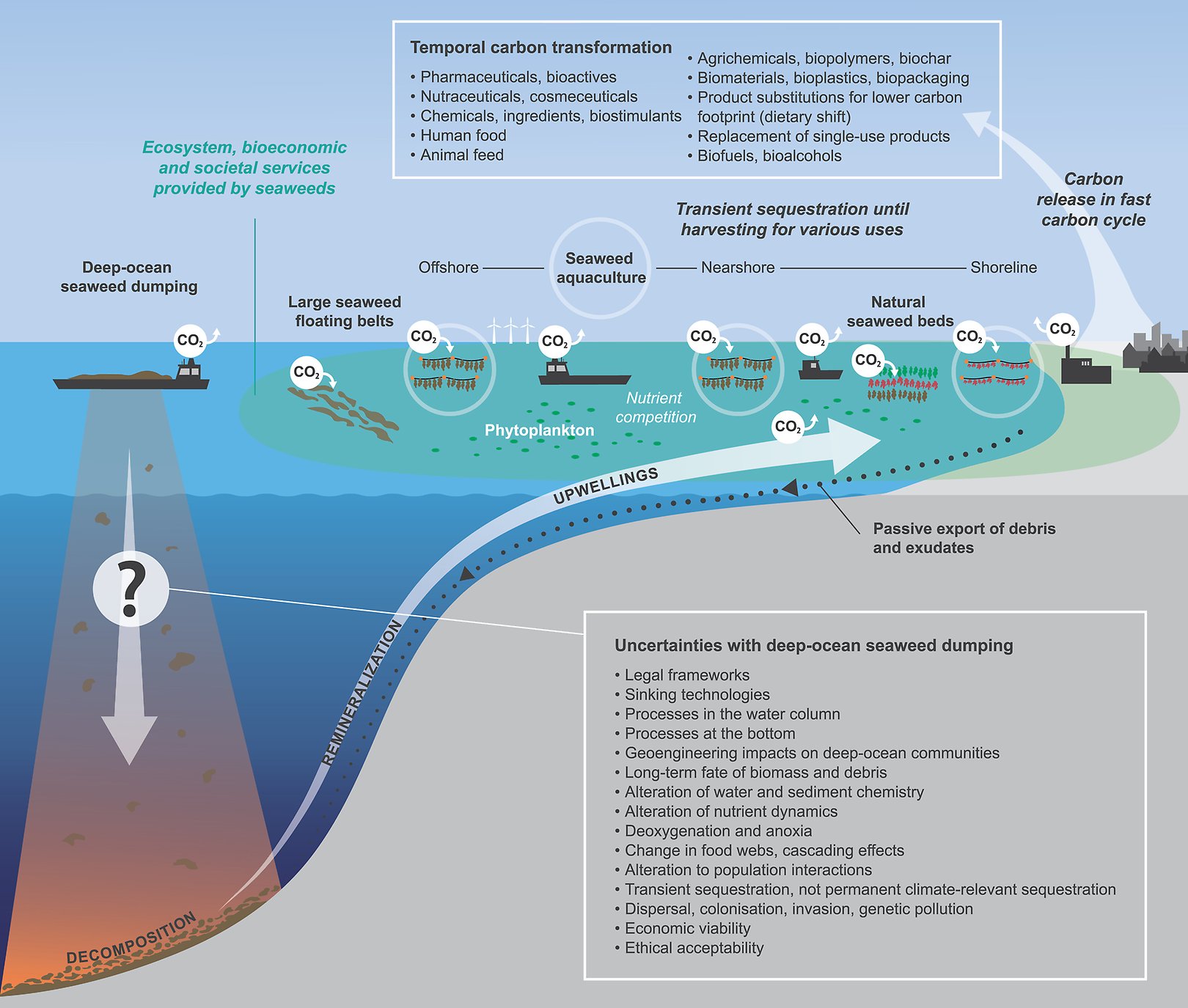Carbon sequestration
Dumping seaweed in the deep ocean is a bad idea. Here’s why

Deep-ocean seaweed dumping for carbon sequestration is questionable, risky, and not the best use of valuable biomass. Photo: KGrif via Canva.
Investments are pouring into projects that aim to grow seaweeds to then dump them in the depths of the ocean, all to sequester and remove carbon from the atmosphere. But such ideas are not backed by sound science and risk deteriorating ecosystems
- Initiatives have started to raise money to grow seaweeds to then dump them in the open ocean
- But even if seaweeds are sunk to the bottom of the ocean, it’s uncertain whether they will be permanently sequestered
- Seaweed dumping can also have severe consequences for the environment
It’s a new trend in geoengineering: initiatives have started to raise money to grow seaweeds to then dump them in the open ocean. They claim that this is a way to bind carbon from the atmosphere and sequester it into the ocean.
But there is limited scientific or engineering evidence to back this up, according to a newly published article in One Earth.
The authors, including Centre researcher Max Troell, argue that it is highly questionable that seaweeds dumped in the deep ocean will result in significant carbon sequestration. Detrimental outcomes on the other end are likely.
The idea behind deep-ocean seaweed dumping is that the deep ocean is characterized by extremely slow decomposition rates due to low temperatures. Dumping is also proposed to take place in intermediate deep oxygen-deficient zones where the decomposition of organic matter also is slow.
Uncertain effects
However, it’s still very unclear whether it’s even possible to securely sink seaweeds, which are mostly buoyant, to such depths, according to the article. If they don’t make it to the ocean floor, they will decompose and their carbon will be released again into the fast carbon cycle. And even if seaweeds are sunk to the bottom of the ocean, it’s uncertain whether they will be permanently sequestered.
We call for an immediate moratorium on the sinking of seaweed biomass in the deep ocean.
Centre researcher Max Troell
Also, seaweed dumping can have severe consequences for the environment. Introduced in large quantities to the bottom of the ocean, seaweeds “could potentially smother seafloor life”, they could alter the sensitive chemical balance on the ocean floor, and disrupt food webs.
“We call for an immediate moratorium on the sinking of seaweed biomass in the deep ocean. Regardless of whether these seaweeds have grown on farms, on wild beds, or whether they are freely floating in the ocean. We need to get the science right and apply the precautionary principle,” says co-author Max Troell who also led another paper just published on the same topic.
 Zoom image
Zoom imageDeep-ocean seaweed dumping, and its associated uncertainties, may not be the tool for carbon sequestration at geological time scales. Credit: One Earth,
Risking ecosystems
Large-scale global seaweed dumping would also require substantial areas of the ocean to be allocated to seaweed aquaculture. That could negatively affect biodiversity and pelagic ecosystem functions and risk conflicting with current uses. What’s more, most of the open ocean is poor in nutrients, so growing seaweeds there would require logistics for providing carbon-heavy inputs such as fertilizers.
Seaweeds are remarkable organisms, but let’s reduce the hype.
The authors
Then there are the legal challenges. The ocean is not a legitimate dump for organic matter, even if it originally grew there.
“Sinking seaweeds into the deep ocean would be subject to international legislations, long-standing anti-dumping conventions, and litigations,” the authors write in the article.
With all that said, seaweeds can play a role in the transition to a more sustainable ocean economy. They can be used to replace products with a much higher carbon footprint, they can be used as food and feeds, possibly turned into biofuels, or used in the production of pharmaceuticals.
“Seaweeds are remarkable organisms, but let’s reduce the hype. While it is causing an amazing surge in interest for seaweeds, we also need to ensure that this ‘seaweed moment’ is translated into a more sustainable momentum for the seaweed sector,” the authors write in the article.
Chopin, T., Costa-Pierce, B.A., Troell, M., Hurd, C.L., Costello, M.J., Backman, S., Buschmann, A.H., Cuhel, R., Duarte, C.M., Gröndahl, F., Heasman, K., Haroun, R.J., Johansen, J., Jueterbock, A., Lench, M., Lindell, S., Pavia, H., Ricart, A.M., Sundell, K.S. & Yarish, C. 2024. Deep-ocean seaweed dumping for carbon sequestration: Questionable, risky, and not the best use of valuable biomass. One Earth.








